Kategorie: ‘Medicine’
Hospital internship in Cyprus
- Medicine
- Cyprus, Nicosia
- General Hospital of Nicosia
- 09/2023 – 12/2023
Application/Finding an internship:
Where to begin and where to end describing this amazing journey, all thanks to the Erasmus+-Internship program. Well, I know how, I am going to take it from the start. Upon deciding that I wanted to pursue this route, I knew I should start contacting the right people at key positions that would help me start the process. One of those Administrators included the person who is responsible for all exchange programs that concern the medical school at the RWTH University in Aachen. Together we put a roadmap down to catch up with the deadlines in the application process. Next stop was getting in touch with the Faculty of Medicine at the University of Cyprus and selecting an academic Mentor/Professor at the Nicosia General Hospital, who would oversee my education and training and provide me with the all the valuable feedback to overcome every challenge. I wanted to do a surgical internship in Cyprus, because I felt it would benefit me the most. I contacted a renowned surgeon in Cyprus, who is at the same time Professor of Surgery at the medical faculty. I was quite surprised by how quickly he responded to my emails, knowing how the bureaucracy makes it a painful process to get something done sometimes. He pointed me to the corresponding Administrators, and we all signed the Learning Agreement, noting down my responsibilities and duties as an Intern at the hospital. The next part of the process consisted of applying for the grant, which was actually straightforward.
Accommodation & Living expenses:
I arranged my accommodation as soon I got an acceptance offer from the Erasmus+-Program, which consisted of renting a small apartment in a private student dormitory intended for students at the University of Cyprus. Albeit small, the apartment covered every need and came with the added benefit of providing ample socialising opportunities, like several common areas, a gym and study halls. These four months I am proud to say that I have built strong relationships and friendships even with many fellow students and roommates, with whom I share many blissful, never-to-be-forgotten experiences. Cyprus is a cheap country to live in, so one would expect to pay less for groceries and rent as the main expenses compared to central European countries like Germany, where I am currently studying. All utilities were included in the rent, which was about 500 Euros per month.
Everyday life/ the internship:
My everyday life comprised taking the bus to the hospital, arriving sharp before 8am. At 8am a hand-over meeting takes place at the General Surgery Department at the Nicosia General Hospital, during which the on-call Physicians receive all relevant information regarding new patients admitted in the ward or seen by surgeon specialists and any important updates concerning existing in-ward patients. This meeting was also the perfect opportunity for senior physicians to partake in medical discourse relating to patients’ treatment plans and imaging findings. What followed next were ward-rounds. Me, as well as the other medical students from the University of Cyprus regularly got the chance to present our patients during rounds and answered questions regarding their medical history, current presentation, clinical and radiological findings and take care of any tasks concerning our patients such as prescribing and administering medications. We were asked to perform clinical examinations and elaborate on symptomology and to came up with an optimal treatment course for them. This course of action has been crucial in providing me with much-valued feedback from esteemed medical professionals and improving my communication and decision-making skills. Upon completion of the rounds, we were all assigned numerous tasks related to our patients, for example requesting consultations from other specialists, collecting blood samples or cultures, arterial blood gases (ABG) and of course documentation of the ward round. Some of us were included in the OR Scheduling, so we had to be ready before the hand-over meeting and to assist in surgeries. Words cannot describe the amazing experience of the Operating Theatre. It is truly quite a different word, especially for someone like who, due to the Covid19 pandemic, had only little exposure to surgical specialties. There, I was able to perform some basic suturing under the guidance of residents of the department. Due to my choice to follow Neurology as my specialty, this was a once in a lifetime opportunity for me to explore the interesting world of Surgery and I am proud to say I grew fond of it over time, something I never expected. As part of our academic plan, we were also able to shadow consultants and residents in specialized centres like the breast cancer and thyroid cancer centre and thus deepen our understanding of the concerning complicated diseases and their treatment. I got to practise performing ultrasound examinations as well, a skill crucial to every Doctor. Apart from that, I should note that the staff on ward was quite helpful, always willing to lend a hand, especially the first few weeks before I got accustomed to the setting. The internship also provided opportunities for active participation in clinical research. My Involvement in a project aimed at improving patient care expanded my research skills and deepened my interest in evidence-based medicine.
Free time/tips:
After the hospital, I was dedicated to fully experience this beautiful Mediterranean island with quite a lot to offer. Getting to the beach from the capital was an easy feat, with regular bus service connecting the busy hub with dreamy seaside destinations like Protaras, Ayia Napa, Larnaca and Limassol. As it is known, Cyprus boasts one of the mildest climates in Europe so a swim even in December was possible and really enjoyable. As far as history and culture are concerned, Cyprus has also quite a lot to offer with ancient monuments, cites and castles. When I opted to stay in Nicosia for the weekend, I was busy exploring the capital and its old and new counterparts and attending happenings all around the city. Nicosia is truly one of kind as it is sadly the last remaining divided capital in the world. A walk around the barricades and fences leaves you with an uneasy feeling, curious and eery enough to spark some interest in exploring the history of the division of the Island and the suffering it has inflicted on its people. One should not miss the plethora of restaurants that are popping all over town, I personally recommend Picnic and Tocayo with their excellent wine and cocktail menu as well as their delicious food offerings. Another restaurant I consider a must-visit is Zanettos tavern in the old town where one could indulge in the rich Cypriot cuisine as well as enjoy lovely traditional live music. Just don’t forget to put your dance shoes on, cause a night in a traditional tavern always guarantees quite a lot of dancing!
Conclusion:
In conclusion, I would gladly recommend the General Surgery department at the Nicosia General Hospital for any medical student, who wishes to experience this island-country that I personally believe could also be called a paradise on earth and wishes to gain some much-needed insights about the medical profession! My Erasmus internship at the NGH was truly a life-changing experience and I am deeply grateful for the support from Erasmus+, which provided me with this unique opportunity, and I look forward to incorporating the gained experiences into my future medical practice.
Working at a hospital in Montpellier
- Medicine
- France, Montpellier
- Université de Montpellier
- 09/2023 – 12/2023
- Application/Finding an internship
Having grown up in France, I had known for a long time I wanted to experience the French healthcare system first-hand. I wanted to find a hospital with a pediatric surgery department, since this was a speciality I was interested in finding out more about and which is not available in Aachen. Since the RWTH medical faculty recommends we spend half of the four-month surgical rotation in general surgery, I applied for two months in ‘chirurgie digestive’ at St Éloi hospital and two months in ‘chirurgie pédiatrique orthopédique et plastique’ at Lapeyronie hospital, which are both part of the CHU de Montpellier (Montpellier University Hospital). I chose Montpellier because of its good reviews on PJ Ranking and because I thought it would be nice to spend the winter in a warmer part of Europe.
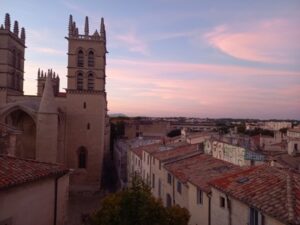
© Olivia Constanze Peel
To apply for a placement (‘stage’) in at the University of Montpellier, you first must contact the head of the relevant department (‘chef de service’) directly sending your CV and cover letter. I did this about a year and a half beforehand, although I know others applied at a much later date. Since there is a considerable amount of paperwork to sort out, I recommend applying far enough in advance. If your application is accepted, you then send the ‘chef de service’ the so-called ‘formulaire unique’ which can be found on the university’s website. Once signed, you send the document to the person responsible for international relations at the University of Montpellier. He then informs you of the next steps to take.
- Accomodation & Living expenses
I found my accommodation privately after going through all the websites (e.g., https://www.leboncoin.fr, https://www.seloger.com, https://www.lacartedescolocs.fr, https://www.appartager.com, etc.) the person responsible for international relations
sent me by email. University accommodation (‘résidence universitaire’ or ‘logement CROUS’) should be available if you express interest early enough. This is much cheaper than private accommodation, which is difficult to find for under 500 euros per month.
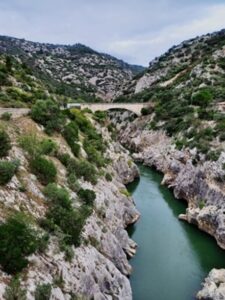
© Olivia Constanze Peel
ESN (Erasmus Student Network) has helpful housing advice and information on their Instagram page on how to plan ahead and avoid scams.
Living expenses are similar to those in Germany, although I would say food shopping was more expensive. I chose to buy a second-hand bike to be more flexible, and because it was a cheaper option than to use public transport. I travelled between Aachen and Montpellier in September and December by train, which only takes between 6.5 and 7.5 hours depending on the connection in Paris.
- Everyday life/ the internship
I spent September and October at St Éloi hospital in general surgery, and November and December at Lapeyronie hospital in pediatric surgery. The day started at 8:00 and 7:45 in general and pediatric surgery respectively and ended on average between 4 and 5pm. In general surgery there was a ‘staff’ (handover meeting) every Monday at 8am. In pediatric surgery there was a daily meeting at 7:45 with the pediatric orthopedic surgeons and every Monday at 16:30 with the pediatric plastic surgeons (speech therapists, a psychologist and members of the dental and maxillofacial departments were also present to discuss patients as a team) and the meeting often included teaching for students. I sometimes worked longer hours depending on the operating plan.
In both rotations students (‘externes’) could assist in the operating theatre, follow the junior doctors (‘internes’) on ward rounds or take part in consultations. Students were asked to organise a rotation plan each week to ensure there was a least one student per operating theatre. If you showed enough interest, you were often able to do the sutures at the end of an operation,and even carry out small procedures under supervision.
There was also the opportunity to follow the on-call doctor as part of their 24-hour shift. This involved seeing patients in A&E (‘aux urgences’), assisting in emergency operations, and in pediatric orthopedic surgery learning how to do plaster casts. I particularly enjoyed my second placement working with children and the variety of cases and surgeries I saw. These included various fractures, craniosynostoses, haemangiomas, cleft palates, dermal naevi, syndactyly, hexadactyly, clubfeet, hip dysplasia etc. Like the French ‘externes’ we were able to have lunch for free at the ‘internat’ (a separate building where some junior doctors lived, most doctors had lunch and lots of coffee was consumed when there was time to rush over between two operations). I really enjoyed the variety of the work and was lucky to work with great teams in both hospitals, which was a massive bonus.
- Free time/tips
There is so much to do in Montpellier, and the Erasmus community is huge. Since I spent most of my free time training with a local triathlon club I cannot say much from experience, but I know from the daily (at times hundreds of) messages in the Erasmus WhatsApp group (they had to create a second one because there were so many international students!) that there was a wide variety of events organised for students including pub nights, sports events, volunteering opportunities, cookery classes etc. On their Instagram page they publish a calendar every month with events pretty much every day, some of which are free. If you buy an ESN card, you can get some of the events at a discount. The card also gives
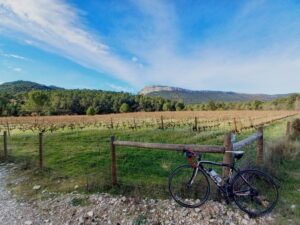
© Olivia Constanze Peel
you discounts for sport, food, bars and travel (e.g., Ryanair and Flixbus).
As of 21st December 2023, public transport was made free for residents in Montpellier (you have to apply for a card with TaM https://www.tam-voyages.com/index.asp and justify residency). However, I would recommend buying a second-hand bike either through the ESN Facebook or WhatsApp group, or on https://www.leboncoin.fr and selling it when you leave. Investing in two locks is a good idea since there is a lot of bike theft in Montpellier (it is quite common to see bikes around town missing various parts). I never used the tram, but they always seemed very full even before public transport was made free.
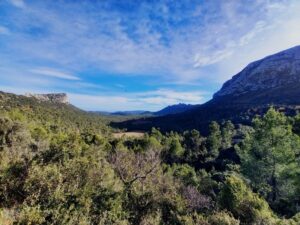
© Olivia Constanze Peel
Most of my free time was spent training with a triathlon club I had contacted before arriving. I went swimming most mornings before work, took part in running training a couple of times a week in the evenings and at the weekend there were always club rides organised. I personally really enjoyed cycling with the group and discovering the countryside and villages north and east of Montpellier. I would recommend visiting the Pic St Loup – if you can’t cycle there then I think the ESN group organised a day trip there for a hike. The views are amazing! Another ride I really enjoyed was to the Col des Lavagnes and the Pont du Diable.
At the beginning of September there was an event called ‘Antigone des Associations’ in the Antigone neighbourhood where all sorts of different clubs and societies were on site representing their organisation and to answer questions. These included sports, culture, philosophy and religion, health, education, dancing, animal welfare, the environment and much more. I went with a friend I met on my placement, and we both thought there was basically a club/society for almost everything you could think of doing in your spare time!
- Conclusion
I would absolutely recommend Montpellier University Hospital for an Erasmus internship. As well as gaining practical skills in surgery, I learnt a lot hearing from doctors’ experiences in different medical specialties and countries, which made me reflect on which path I wish to pursue and consider certain aspects of my future career differently. Being confident and a having a good level in French is an advantage to manage the fast-paced day in surgery, to fit in with the team and to take away as much as possible from the experience.
Surgical Rotation in Luxembourg
- Medicine
- Luxembourg, Esch-sur-Alzette
- Centre Hospitalier Emile Mayrisch
- 07/2023 – 10/2023
Application process
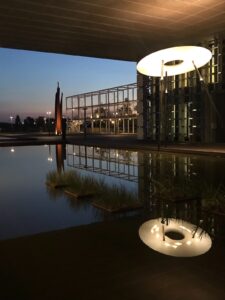
© Lea Elsholz
After having done an internship („Famulatur“) in France earlier in my study program, I wanted to return to a French-speaking country. One might argue about whether or not that applies to Luxemburg – but more of that later. A friend from university, originating from Luxemburg, highly recommended all Luxemburgish hospitals (there’s only 3 of them) for an internship. Unfortunately, I had already missed the application deadline for the CHL in Luxemburg city – that is the in-country PJ application deadline of the University of Heidelberg, Germany, that CHL is affiliated to as academic teaching hospital. Luckily, the University of Saarland in Homburg, Germany, was very cooperative and offered one of their still-open places for my surgical rotation at Centre Hospitalier Emile Mayrisch (CHEM) in Esch-sur-Alzette. As I am studying at RWTH Aachen University they just required a copy of my last exam („M2“) and some general information (the usual health certificates etc.). All other communication was led by the responsible person for the medical students at CHEM.
Accomodation & Living expenses
Exchange students get offered free accomodation in relative proximity to the CHEM, organised by the hospital. There was a 150€ security guaranty that is reimbursed some days after the end of the internship if everything is ok with the flat. Alternatively, one gets 400€/month instead of an accomodation. In Luxemburg, it’d be kind of a miracle to rent a flat short-time on these terms… it’s only interesting for those who have family or friends in Luxemburg they can stay with, as e.g. Luxemburgish medical students studying abroad would do. The flat was a shared apartment in a only some-year old building for up to 6 flat mates. During my stay, I only had 1 flat mate for the last 3 weeks. The student before me was living with up to 2-3 flat mates at a time – as far as I heard, it would rarely happen that the flat was fully booked. There are 6 rooms that all open on a long balcony and have their own bathrooms. At the end of the balcony, there is a common room with shared kitchen (2 sinks, 2 fridges etc.), cooking space and microwave. In the basement, there is washing machines and dryers (3€ each). The flats are located in Belval, an emerging urban space 2-3 km from Esch, close to the French border. There is shopping centers, restaurants, a cinema, bus stops and the train station all in <10 minutes walking distance.
Longer-term interns (several months) seem usually to get offered this type of accomodation. There were also 2 international students doing 4-week internships that lived in another shared apartment with students from different programs somewhere else in Esch.
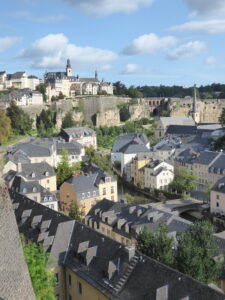
© Lea Elsholz
The public transport is free for everyone in all of Luxemburg (meaning the whole country, including the city as well as regional trains) for some years now, so there aren’t any costs for taking buses or trains. Also, there are e-bike stations that can be freely used with a personal card (no fee), mostly, these are more or less ridable and there’s a lot of e-bike stations all over the region. The program is called „Vel’ok“. As I spent my summer doing the internship, I often took the bike from or to work. This is especially nice as there’s a newly built bridge for bikes and pedestrians linking Belval and Esch-sur-Alzette (the „Velodukt“).
In exchange for the free transport, shopping prices are about 1.5x the German ones.
Fortunately, the hospital also offers free meals to the medical students, limitless – so if you really try, you could have a quick breakfast in the morning, then lunch in the cafeteria and also buy a sandwich for the evening. The offer in the cafeteria is quite ok, vegetarian options are rather scarce so there’s not much difference to the hospital cafeterias I got to know in Germany.
Everyday life / the internship
As usual in surgery, my days started early at about 7.15 am. We did get all clothes, an own phone, access cards and an own account for the intra-hospital digital patient-care system from the hospital. I spent half of my internshiop in orthopedics/trauma surgery and the other one in general & vascular surgery. I also got to see some operations by the plastic surgeons, both aesthetic and reconstructive ones. In the morning, I would go to the OR where the surgery program started at about 7.30 am. Only in general surgery, the responsible doctor (which is the teaching responsible of the University of Saarland) wants the medical students to do rounds on his patients before joining the team in the OR.
In most of the Luxemburgish health system and all of CHEM, the doctors are independent and also the interns (= german „Assistenzärzt:innen“) are employed by the doctors and not the hospital (similar to german „Belegärzt:innen“). Thus, the surgeons see their patients either in their doctor’s office or in consultation in the hospital’s polyclinic, operate on them and are responsible for the post-operative treatment as well as the follow-up. Therefore, there is no department chiefs, collective rounds or department meetings. Most of the doctors work together in groups, sharing expenses for their office and helping each other out when on holiday etc. From what I experienced, this system reduces competitive behavior between doctors while also producing more diverse treatment concept due to less hierarchies also concerning the details of patient care.
There also is no intern solely responsible for the ward, so ward-related work is done before, after or in between surgery (and yes, that results in a lot of wo
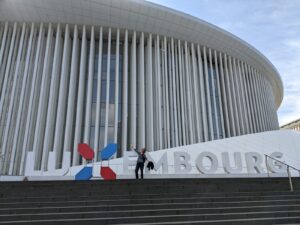
© Lea Elsholz
rk for the interns – on the other hand already 1st-year interns spend a lot of time in the OR compared to German interns).
We students were expected to show up in the OR and participate in the surgeries. In ortho/trauma I was quite free to choose every day which doctor and surgery I wanted to work with/see. In general/vascular, I was mentored by one of the interns and mostly followed his rotation plan. We usually weren’t planned as assistants for surgery, though sometimes doctors asked for us to assist when they were short on interns. All other times, most of the doctors were really nice, let us scrub in/do 2nd assistance and gave explanations.
On the practical plan, the interns usually let me do the skin and sometimes subcutaneous sutures. Apart from the usual „passive“ surgery assistance, I also do smaller tasks like take out some osteosynthetis material or do a varice stripping. In the policlinic, I was cleaning and bandaging wounds, taking out sutures etc.
There wasn’t really regular teaching sessions though there is 2 conferences students are expected to attend, the vascular conference on Mondays from 4 to 4.30 pm and the Morbidity&Mortality conference on Wednesdays from 4 to 4.30 pm where students rotate doing presentations of either clinical cases or disease-treatment related content. There was a really good 2 hrs workshop on how to treat chronic wounds, organized by the hospital’s wound management team that I’d highly recommend.
Lunch break was nearly always possible for us students, though you often had to organize it yourself as most surgeons just operated until the end of the program (around 2.30 pm).
We were always welcome to join consultations in the policlinic. The emergency patients were covered by emergency doctors, so there were no surgeons regularly assigned to the emergency room. Still, students doing their surgical or internal rotation could also go there.
I was surprised by the really good atmosphere (of course there are always some exceptions or bad days) in ortho/trauma, re-examinating my prejudices about what to expect in a team of (mostly male) surgeons. Sadly, I got to taste some of that chauvinist-discriminating vibe when switching to general/vascular and once more got used to invent all kinds of reactions on non-appropriate „jokes“. Apart from that, I really felt welcomed by everyone, doctors as nurses and medical assistants in the OR.
Speaking of – if you’re a linguophil, Luxemburg is definitely worth a visit: Having French and Luxemburgish as official languages, Luxemburger communicate in wild combinations of Luxemburgish, German, French, Portuguese and Italian, naming just the most common (mother) tongues. For students from Hungary and Ukraine, they also switched to English, leaving me with a language bursting headache for the first weeks until I got used to it – and really enjoyed the Babel situation. A lot of nurses originate from France, Belgium or Luxemburg, so speaking French is nice for interdisciplinary communication and also patients. The surgeons were mainly German or French speaking as there is no full medical curriculum in Luxemburg.
Free time / Tips
To be honest, I spent my first 2 week-ends recovering from work – it was my 3rd rotation and still, getting up at 6 am, together with the physically at least medium-demanding work in the OR and the new environment consumed my energies. After that, I usually went on trips on Saturdays and chilled on Sundays – it’s really hard to do anything else than hiking in Luxemburg on Sundays as most restaurants etc. are closed for the day.
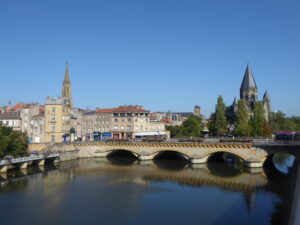
© Lea Elsholz
Luxemburg has really beautiful and diverse nature: I went hiking in the north around Clervaux. There, I also visited the great photo exhibition „The Family of Man“ by Edward Steichen which belongs to the UNESCO World Document Heritage. I highly recommend the Mullerthal trail in the south-east, the so-called Small Luxemburg Switzerland. It’s a beautiful hiking trail that can be adapted in various ways and leads through amazing sandstone rocks, crossing forest and creeks. In summer, the „Lac de la Haute-Sûre“ is the place to go to enjoy canoying or swimming surrounded by Auenland-like landscape in very clean water – it’s actually the only free water (bigger lake/river) in the country. Close to Esch, there is a nature reservation called „Ellergronn“ that offers several small hiking trails. The whole Luxemburg south is called „Red Rock Region“ due to all the iron ore deposits that is the basis from which a long industrial story of the region emerged.
Speaking of: there’s two gigantic furnaces that Belval is built around. After having been switched off in the late 90s, they were built into a museum / historical site that can be visited. The view from the middle platform of one of the furnaces is definitely worth the steps and offers another inspiring perspective on the many works of known architects rising around the furnaces and hosting the university as well as private labs and enterprises.
Usually not very fond of urban spaces, I really liked Luxemburg city (shortly called „the city“ among Luxemburgers). The city is build on two levels (upper and lower town) that are linked by a LOT of stairs and steep pathways. The lower town has nearly village vibes with a lot of trees and two creeks flowing through, while the upper town is has a really nice city center, a lot of shopping possibilities (mind your wallet, though), several churches, the grand-duke’s palace of course and again a lot of parks. For those interested in underground research, the „Kasematten“ (kind of catacombs) are a tourist highligh not to miss. On the other side of the Pfaffendal is Kirchberg: Plane fields for a long time, the growing
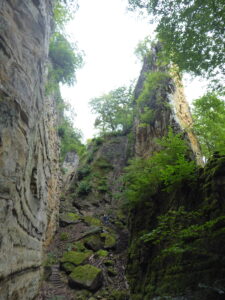
EU facilities became to much for the inner city of Luxemburg in the early 2000s so they were moved to the opposite hill and a new district emerged, called Kirchberg. Besides impressive modern architecture hosting EU institutions, there’s also a lot of international companies, an arena and Luxemburg Philharmonie.
The cities of Metz (F), Nancy (F) and Trier (D) lie all within a 1-2 hrs drive with public transport and are also worth a trip.
There is a rich cultural program in Esch-sur-Alzette and Luxemburg in general (mind the summer break though). In Belval, there is a big concert hal („Rockhal“), a theatre in Esch and several clubs, theatre, opera etc. in the Luxemburg city. For sports, there is a free climbing hall meant to open soon in Belval itself, there is also indoor climbing possibilites in Luxemburg city. I discovered a really nice dance studio in Schifflange (2-3 km from Esch/Belval), offering Yoga, Pole Dance and Aerial Silk. There’s also a public pool in Esch though unfortunately just an indoor one – Luxemburgers are more likely to have their private pool in their garden, I was told, although I’m afraid that is more of a Luxemburg cliché…
Conclusion
In the hospital, there was a remarkable summer break in August when most doctors were on holiday and there was a really limited program in the OR. All other time of the year, the place is quite busy so I wouldn’t recommend it if one is looking for a beach & chill surgical rotation. If you’re interested in surgery, not afraid of languages and value a good working atmosphere, Luxemburg is the place to go 😊 For more exotic specialities like neurosurgery you’d have to apply to CHL (Heidelberg’s application deadline is June of the year preceding your rotation abroad, as to my knowledge). Also, blood samples are performed by the nurses, so you’ll actually be in the OR
I had a good time in Luxemburg, hospital- as free time-wise, and am thankful to having been supported by the Erasmus+ grant that enriched my stay by really allowing me to get to know the country also outside the hospital.
Making magical memories in Paris
- Medicine
- France, Paris
- Sorbonne Université
- 07/2023 – 09/2023
Application/Finding an internship.
For quite a long time I dreamed of going to Paris for working and living there. That`s why I decided to spend 2 months in this beautiful city during the practical year in my medical studies. Once my intention was clear I started looking for contact persons being responsible for international affairs at my preferred university, the Sorbonne. After several email exchanges with the head of the international office at the medical faculty, I received a list with free spots left for my preferred period. Fortunately, I sent my application early enough (nearly one year in advance), so a few free places were still available; I hereby confirm applying as soon as possible because even one year in advance, places were limited and already reserved for French students. In the following, I had to upload my application with all the necessary documents (including CV, proof of language, Health insurance, Letter of motivation, Erasmus-Learning Agreement) on a Sorbonne interne platform to complete my application. I also applied at the medical service directly (even when the head of the international office will manage this for you) to get sure of having tried my best for realising my dream.
Accommodation & Living expenses.
Living in Paris is quite expensive. As all the big cities in the world, cheap apartments near to the city centre are rare and the housing market is hardly disputed. Personally, I was quite lucky because I knew another Erasmus-student who was looking for the next tenant. What I can really recommend for finding an accommodation is to participate in a preparing course of “Campus France Deutschland”. There you will get plenty of tips on which platforms you can find a room for your stay for example “La carte des collocs”, “leboncoin” or “A partager”. For the monthly rent the average price in Paris should be estimated with 700-1000 Euro. If you are lucky enough to get a place in a student housing, like “The Crous”, the rent will be lower, but places are hard to get, and you have to apply early in advance.
Paris is divided into different districts. I have lived in a multicultural area near to the train station “Gare du Nord” not far away from famous Montmartre, known for its artistic history and the well-known church Sacré-Coeur. Even when this area is renowned for many conflicts in the past due to poverty issues and immigration conflicts, I really appreciated living in this area during my stay because it gave me the possibility to get an authentic insight how it feels to live in Paris not as a tourist but as an inhabitant. Besides, there are many charming restaurants in the streets around the hill of Montmartre and street life is always vibrant. Compared to Germany, food prices are much higher in the supermarkets. For vegetables and fruit, the cheapest way is to go to the local market which takes place on Wednesdays and Saturdays just near to the metro station Barbes-Rochechouart.
Everyday life/ the internship
During my internship I worked at the university hospital Saint Antoine in the 12th arrondissement, near to “Place de la Nation”. To get there I took the metro, the Parisian subway, which is quite the easiest way to move around the city. Sometimes I went by bike which was also a wonderful experience. I really enjoyed cycling the big boulevards and nearly everywhere you can find spots to rent a bike, I truly recommend discovering Paris by this. In the hospital, medical students so called “externs”, work under the supervision of “interns”, who have already finished their studies. Thanks to the system that every student is guided by a certain medical staff member, there is always an experienced person which you can ask for help. My daily tasks included the anamnesis and physical examination of patients, including the medical documentation of each patient concerning their progress of disease and therapy. Two times per week there were assemblies where the disease history of every patient was discussed with all doctors of the service. Normally medical teachings for students were planned for Friday mornings but not during summer. In general, my working day started at 9 in the morning and ended in the afternoon. All in all, I got the impression that patients were treated in detail and that the medical staff invested a lot of time for personal contact.
Free time/tips
Paris as a city has so much to offer: Whether museums, parks, bars and restaurants – there is something for everyone. Since I had already been to this wonderful city several times before my Erasmus stay, I was able to focus on a Paris off the beaten path during these 2 months. 4 days after my arrival, one of the biggest events of the summer was on the agenda: “La fête nationale”, the French National Day. In addition to the morning parade over the Champs-Elysées, where President Emmanuel Macron was received like a pop star, the Eiffel Tower shone in full colour on the “Champs de Mars” in the evening. With such an impressive firework, which is unparalleled, one can get an idea of the pride with which the French revere their country. And they are right! When thinking of France, everyone immediately conjures up images of fragrant croissants, picturesque cafés and a good glass of wine – if a country had invented pleasure, the French would be right at the forefront. Paris itself has so many boulangeries and delicacies to offer- probably a whole year would not be enough to test all of them. Since I lived in Montmartre district, I went on a culinary discovery tour especially there, what I can recommend to everyone. In the small streets not far away from the church “Sacré Coeur”, your own taste buds are sent on a world tour: Whether it’s a typical local flan, oriental couscous from Morocco or Argentinian empanadas – the 18th arrondissement lives cultural diversity on all levels. In case you feel homesick, you should order a portion of potato salad with Wiener Schnitzel including wheat beer fresh from the tap at the beer garden of the “Kiez Kanal, a lovely place near to the “Bassin de la Vilette” . In addition to culinary variety, Paris also offers an immense wealth of mental nourishment: from classics such as the Louvre, the Eiffel Tower or the Champs-Elysees to lesser-known leisure activities such as a walk along the disused railroad line “Petite Ceinture” or a visit to the impro theatre “Theatre de la Gaite” at Montparnasse district – boredom is a foreign word in Paris! On the other hand, if you feel more like nature and relaxation after the hustle and bustle of the crowds, you will find plenty of green spaces in numerous parks, such as the “Buttes Chaumont” or “Bois de Vincennes”, to unwind.
Conclusion
Describing Paris in a few words remains impossible. This city simply has so much to offer that even the Parisians admit discovering new facets each day again and again. For me, it has always been a dream to live in Paris one day and to be able to immerse myself in everyday life. After these 2 months I am incredibly grateful to have made this experience. I’m taking with me a suitcase full of magical memories back to Germany; impressions of a city whose charming atmosphere is always worth a trip. I was able to learn a lot, both professionally and personally, and I am firmly convinced that I can make use of the skills I learned here in the future. To anyone who has good command of the French language (or is willing to learn it), without exception, I would immediately recommend doing an internship abroad in this wonderful city, it is a once-in-a-lifetime opportunity that may not return anytime soon! Or as Audrey Hepburn put it: Paris is always a good idea!
Practical year in Innsbruck
- Medicine
- Austria, Innsbruck
- University Hospital Innsbruck
- 07/2023 – 09/2023
- application
I sent an application with a letter of motivation, curriculum vitae and certificate of matriculation to Monika Schlager about 1 ½ years in advance. She is the international coordinator of the medical faculty and responsible for Erasmus students.
Ms. Schlager answers very reliably and quickly and sent me an internship confirmation within a few days. The places in Innsbruck are very popular, which is why it is worth applying early.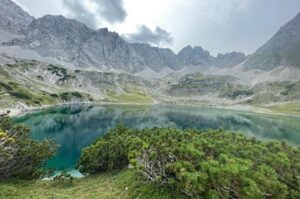
© Jana Mattes
Only whole months can be done in Innsbruck, so it is only possible to start on the 01st of the month. The wards Oncology and Gastroenterology were assigned to me by Mrs. Schlager, but if you have desired wards, you can certainly indicate that.
2 Accomodation/ Living
Austria and especially Innsbruck are a bit more expensive compared to Germany.
I started looking for accommodation about two months before the start of my internship. I mainly looked through the site WG-gesucht and found there a two person shared appartement in close proximity to the main train station as well as 5 minutes by bike to the clinic.
The rent was quite expensive at 630 euros for a shared apartment.
Overall, it is quite difficult to find an apartment/room in Innsbruck. In the summer months from July-September it is a bit easier, because the students have semester break and many sublet their apartments. In November/December or in March it is a bit more difficult to find something.
Food prices in Innsbruck are also about 20-30% more expensive than in Germany.
You get free lunch in the hospital, but you only get the Erasmus money and don’t get a salary anymore.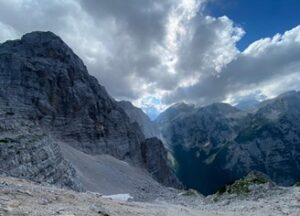
© Jana Mattes
3. the internship
I liked the internship in internal medicine very much. In Innsbruck, unlike in Germany, there is not such a great shortage of doctors. On the oncology ward, we were partly three doctors and I for a total of 8 patient rooms.
The working hours are also much better than in German university hospitals. It is rare that the interns have to work overtime.
The relaxed atmosphere made the internship very pleasant for me. There was always a doctor who had time to show or explain something to me.
My main duties were admitting and educating patients, writing discharge letters, some blood draws (when nurses couldn’t do it) and pulling CVCs and drains as well as helping to supervise famulants. When there was time, I could always grab the ultrasound machine and practice on patients. My working day usually lasted from 8 am – 4 pm, but if there was little to do, I was often sent home around noon.
The head physician and the senior physicians of the ward are also very friendly and like to explain or do a little teaching during rounds. I was there for a total of two months.
The last month I was in gastroenterology. Here the doctors were also very well staffed and my tasks were similar to those in oncology. Overall, however, I liked the ward work a little less, as hardly anything was explained and there was little teaching.
Unfortunately, it was not possible/desired to look after patients myself from the beginning to the end of treatment.
What I found very positive was that, unlike in Germany, less attention was paid to the money and the patients were very well cared for and treated.
Overall, I can still highly recommend an internship in Innsbruck. The doctors are all very nice and always have an open ear for questions. You can work independently but also leave earlier if there is little to do. It is also possible to accompany doctors on duty in the emergency room, where you can learn and see a lot.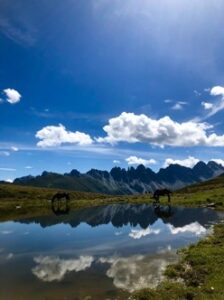
© Jana Mattes
4. free time
Innsbruck is a paradise for those who love climbing/hiking/mountain biking or road biking. In winter it is of course also a dream for skiing/snowboarding.
During the week I was often in the climbing/bouldering hall, where you often saw world famous climbers.
On the weekends I went hiking and climbing in the surrounding area. Unfortunately, I met few other Erasmus students. However, through various Facebook groups, it is easy to make friends with other people who are new to the city and thus find connections quite quickly. The mountains around Innsbruck are beautiful and you can go there easily by bus/ train.
- conclusion
Overall, I can recommend an internship or a tertial in Innbruck to anyone who wants to get a good teaching and something out of the internship, but who also knows how to value his free time and especially likes outdoor activities.
I found the comparison to Germany, where doctors in university hospitals often work 4-5 overtime hours a day and the treatment of patients is much more focused on money, very impressive.
Practical year in Kilkenny
- Medicine
- Ireland, Kilkenny
- St. Luke’s General Hospital
- 07/2023 – 09/2023
My time in Kilkenny was an outstanding experience that combined enhancing medical skills with
personal enrichment. This report reflects about different aspects of my stay, such as the
application process, finding an accommodation, my everyday routine during the internship, and
my explorations of Ireland’s stunning landscapes.
1. Application/Finding an internship
I discovered St. Luke’s General hospital during an online search on the webpage PJ-ranking. This
webpage is used for writing reviews about the internships throughout the practical year and
students may leave contact addresses to facilitate connections between medical students and
healthcare institutions. The webpage featured positive reviews about the hospital in Kilkenny,
indicating its reputation for providing valuable learning experiences and exposure to various
medical specialties. The opportunity to rotate through multiple wards, including gastroenterology,
cardiology, and the emergency department, was a significant factor that aroused my interest.
The application process for the practical year internship in Internal Medicine was initiated by
applying via email to St. Luke’s General Hospital in Kilkenny, Ireland. The application included a
comprehensive CV, a cover letter detailing the applicant’s motivations, relevant experiences, and
aspirations for the internship. After a few days I received a positive answer and was accepted. It
was well-organised and I received a letter of acceptance stating necessities which had to be
fulfilled. One of the primary requirements for participation was the submission of proof of
vaccination against common infectious diseases. In addition to vaccination, the acceptance letter
outlined the necessity of obtaining comprehensive insurance coverage. This insurance was
specifically aimed at covering any potential accidents that might occur during the intern’s work
hours, especially those linked to medical errors. After submitting all necessary documents, I
booked my flight ticket and the journey could begin.
2. Accommodation & Living Expenses
While the hospital lacked on-campus accommodation, they provided valuable support by sharing
contact details of two landlords offering shared housing. I found myself settled into a cosy
residence just a 25-minute bike ride from the heart of the city and an even shorter ride of 15
minutes to the hospital. The landlord provided the bicycles, which facilitate transport a lot.
Kilkenny is connected to various cities through buses and has a train station. With the rent
amounting to a reasonable 165 Euro per week, the accommodation proved to be a good option
regarding prices in Ireland. The landlady’s kind demeanour and willingness to assist with any
concerns enhanced my stay. Living standard in Ireland is higher compared to Germany. There are
two cards that reduce prices on public transport and for visiting cultural sights. I would highly
recommend buying both cards. The leap card is for public transport and the heritage card for
attractions.
3. Everyday Life/The Internship
My daily routine during the internship typically started at 9 am with ward rounds or in the
outpatient department. Ireland does not have the concept of resident physician. Therefore,
patients attend their GP when facing a medical issue and will then be transferred to a doctor in
hospital as an ambulant patient. During my time I started working in the hepatology unit. Common
diseases with whom patients presented with were viral hepatitis, alcoholic steatohepatitis and
autoimmune liver disease. Later, I got the chance to follow the gastro team on the wards. What
truly set this experience apart was the hands-on involvement. Although students in their practical
year cannot work as much practical as in Germany, but the more my colleagues knew about my
skills, the more they allowed me to help them. My tasks varied between inserting i.v. lines, taking
histories, writing prescriptions and discharge letters. My work has always been supervised by an
intern, so I have never experienced feeling overwhelmed or being left alone. By mid-August, the
Irish students returned after their summer break. This was a great experience because we got in
contact quite quickly and did activities together. Moreover, by the time they came back they
established daily teaching sessions twice a day, enhancing my understanding of medical practices.
Kilkenny is a charming city located in the heart of Ireland with a rich history, vibrant culture, and
plenty of attractions to explore. After work, I had the chance to explore most of its cultural
heritage. Kilkenny Castle is a magnificent medieval building that offers an insight to Ireland’s past.
Second, there is St. Canice’s Cathedral. This historic cathedral features a round tower with
breathtaking views of the city and surrounding countryside. Not to forget about the traditional
pubs with live music. They really convey the typical image of Irish culture and tradition.
4. Free Time/Tips
Ireland’s nature is stunning! You have never seen 1000 different varieties of green? In Ireland you
will! Its rainy days must be mentioned as well, but the moment you bought rain trousers and
wellies you are prepared; the journey can start. My exploration led me to places like Kenmare,
Ring of Kerry, Limerick, Killarney, Cork, Tramore, and Dunmore East’s stunning cliff walk. My
favourite trips were the Ring of Kerry and walking along the beach in Tramore. The Ring of Kerry
is a marvellous road leading you through the coastal region in the southwest.
And then there is Dublin. Dublin, with its iconic attractions, including Trinity College and Temple
Bar. Dublin, a digital hub, a vivid city with its rough north side and dignified south side. Dublin,
being a cultural centre with the national gallery of Ireland, Dublin castle and much more to be
discovered.
I would recommend having a car in Ireland, because it facilitated journeys to remote countryside
locations that public transport often couldn’t access. Luckily, one of the other German students
brought his car with him. From time to time, we took trips together.
5. Conclusion
In retrospect, my stay in Kilkenny was an experience I don’t want to miss. The combination of
getting to know a different healthcare system, learning medical work in another country and being
warmly welcomed made my stay unforgettable. It has enriched me in so many ways, being it
personal or professional. Therefore, I am grateful for this experience.
Working in a hosptial in Saint-Pierre – La Réunion
- Medicine
- France, St. Pierre
- Centre hospitalier universitaire la Reunion
- 03/2023 – 07/2023
Application:
I applied about a year in advance through the e-mail address etudiants-medecine@chu-reunion.fr. The application required a CV, a letter of motivation and the certificate of matriculation. Compared to Martinique and Guadeloupe, you get a pretty reliable answer when applying for la Réunion. At first, I only received a confirmation that the application had arrived, and even with more inquiries, I did not receive the final acceptance until the beginning of December. Therefore, perseverance and patience are required. However, the lady in charge, answered all my questions very quickly and reliably. After the acceptance, I still had to send some documents such as a copy of my passport, liability insurance and vaccination certificates. Overall, I found the application process somewhat lengthy but uncomplicated.
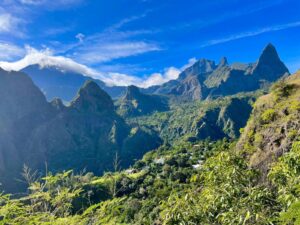
© Jana Mattes
Accommodation and living costs
I started looking about 1-2 months in advance. The French and also the Reunionese are still very active on Facebook, which is why I joined various Facebook groups (just enter Colocation Saint-Pierre/ Coloc Réunion or similar on Facebook). Furthermore I searched on Airbnb and leboncoin. Leboncoin is more or less the French Ebay. In the end, I found a small one-bedroom apartment near the central bus station on leboncoin. I also bought a bicycle through leboncoin, which I also highly recommend for the way to the hospital, as traffic is really annoying on the island. The apartment was quite expensive (800 euros/month) and since I got to know two other German students over time, I moved in with both of them after two months. Here it is worth asking around in the hospital if there are doctors who travel for a while and unrent their house. We were lucky and lived the last two months in a large house with a pool 5 minutes walk from the hospital (400 euros/person).
Also, if you want to do something on the weekends, it is worth renting a car. Five of us shared a car for 450 euros a month. There are buses, but these often do not go to the starting points of the hikes and you are much more flexible with the car.
Otherwise, I have found the cost of living is not much more expensive than in Europe. You can get fresh fruit and vegetables very cheaply at the weekly market and free lunch at the hospital.
The internship
My workday began at 8 a.m. in the visceral surgery department. At first, no one really felt responsible for me. A nurse got me work clothes and then I went along on rounds. The rounds were generally kept very short and there was no teaching. After that, I was always sent to the operating room. Since there was only one resident at the time I was there, I was often the first resident in the operating room. Here, questions were always answered nicely and the atmosphere in surgery was very relaxed and less hierarchical compared to Germany. Once or twice I was also allowed to help with suturing, but in Reunion, unlike in Germany, this is often done by the senior physicians themselves.
At noon, I almost always had lunch with the other erasmus-students and since the doctors work relatively long every day (until 18/19h) and do not send you home, I went home at some point usually around 3 or 4 pm.
After 6 weeks in the visceral surgery I changed the department, because I also wanted to see other departments. This was possible without any problems. I then spent 2 weeks in the emergency room. Here I was able to work very independently, examining patients, suturing and writing reports.
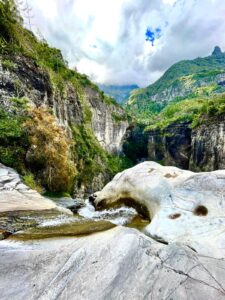
© Jana Mattes
The last weeks I was in the orthopedics department together with 3 other erasmus students. Here I often switched between the outpatient clinic and the operating room, the doctors here were really nice and the medical standard was quite high.
Overall, you have to have a high level of personal commitment and show a lot of initiative to learn something, but if they notice that you are interested, it is quite possible to learn a lot. You can also arrange the working hours as you like. The doctors are overall very relaxed and nice, but they don’t really know what to do with foreign students. In addition, they don’t pay much attention to possible language barriers, which is why I only recommend an internship there if you speak a sufficiently high level of french.
Free time
Reunion is an really beautiful island in terms of leisure! For anyone who loves hiking, climbing, nature and outdoor activities, the island will be a paradise. We spent most weekends backpacking and camping in the mountains. Must-dos are of course the volcano, Piton de Neige and Mafate. During the week, we often went to the beach bar on the small beach of Terre Sainte in the evenings. On Sunday evenings there are always free live concerts in Saint Leu, which are worth a visit.
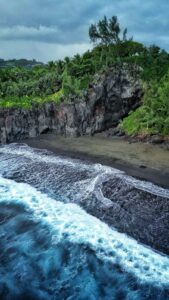
© Jana Mattes
There are always many new people on the island who only stay for 1-2 years, so it is quite easy to meet new people. Also in the hospital we were a group of one Spanish, three Germans and three Swiss. French students were few, because in la Réunion you have to continue studying on the mainland after the 6th semester.
Overall, of course, it was very hot and humid in the first months (March, April), then it cools down considerably in the winter.
Summary
Overall, I can recommend a stay on la Réunion to anyone who likes nature and mountains. The landscape there is simply insanely diverse and beautiful. In the hospital you have to be very proactive and stay quite long in the evening if you want to learn something. Otherwise, you can be very flexible with your working time and also take a day off if you want.
Clinical rotation in the department of surgery in Bruneck, Italy
- Medicine
- Bruneck, Italy
- Università di Verona
- 03/2023 – 07/2023
1. Application/Finding an internhip
The preparation for my hospital internship in surgery was very smooth. I applied 7 months
before my stay at various hospitals throughout South Tyrol. I was able to find an internship for
the entire 4 months in Bruneck. Although everything worked out well I would recommend
applying earlier to be on the safe side. There was a dedicated contact person, Dr. Neumair, at
the hospital in Bruneck who handled communication with the University of Verona. She
ensured that everything was arranged for my stay. Working with her was extremely helpful and
reassuring, as it allowed me to focus on the professional aspects of my internship without
worrying about organizational matters. The International Office was also very helpful with my
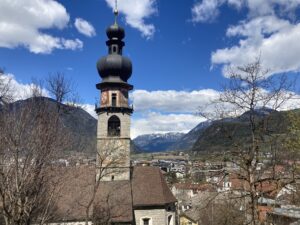
Bruneck
© Felicitas Weiß
Erasmus Plus application, providing clear guidance and prompt communication with the
respective contact persons. Their support made the process stress-free, enabling a rewarding
international academic experience during my hospital internship.
2. Accomodation & Living expenses
After a quick research on the internet (http://accommodationunibz.blogspot.it/) I was able to stay in a 5-person shared
apartment with other students from the University of Bozen. For 520€ per month I got a fully
furnished 17sqm room. The shared apartment had great common areas with a pool table and
Netflix account. There was also a laundry room and a cleaning lady who came every two weeks.
The accommodation was perfect and allowed me to have a pleasant stay during my internship.
There were also some cheaper rooms for subletting, but I preferred to live in a shared apartment
so I could connect with people who live in Bruneck and know the area.
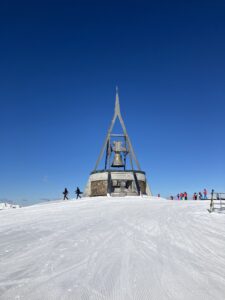
Kronplatz
© Felicitas Weiß
The cost of living in South Tyrol is comparable to Germany. Groceries are a bit more expensive.
However, public transportation is quite cheap and reliable. Most importantly, aperitivos are
cheaper than in Germany and are usually served with a small snack on the side!
3. The internship
My surgery rotation was an enriching and rewarding experience. Working in the general surgery
department provided a wide range of opportunities, from assisting in the operating room to
helping out in the outpatient clinic and the emergency department, known as “pronto soccorso”.
Everyone in the team was genuinely kind and welcoming, always ready to answer questions
and eager to receive assistance.
The hands-on experience was good. I was given the chance to examine patients, perform
ultrasound scans, and even practice suturing. The surgeons made me feel like a valued member
of the team. During quieter times in general surgery, I was encouraged to observe and assist the
orthopedic team.
The hospital staff must speak both Italian and German, so it is easy to communicate with them.
There are only a few patients who speak only Italian or Ladin. In these cases, the nurses
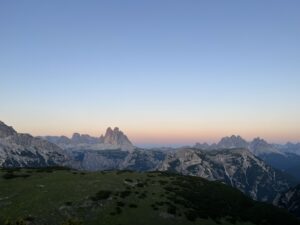
Zinnen-Blick
© Felicitas Weiß
translate, and after a while I picked up the common expressions and was able to use them
myself. If you are not from southern Germany, the South Tyrolean dialect can also be a bit
difficult at first, but you understand it with time.
My day started at 7:45 am and I usually stayed until 2:30 pm. Sometimes I could leave earlier
or had to stay longer to assist in the operating room, depending on what surgeries were coming
up. Besides me, there were five other students in general surgery and trauma surgery, so we set
up a rotation schedule so we didn’t have to come in every day or could leave early. Our schedule
also included weekend duty (on-call shifts). In return, we got two days off during the week.
A definite highlight was the cafeteria’s delicious meals. As students, we enjoyed complimentary
access to a variety of Primi Piatti, Secondi Piatti, a salad buffet, and delicious desserts.
4. Free time/tips
During my free time, I took an Italian language course at a language school to improve my
communication with patients. The course proved to be very helpful during my hospital
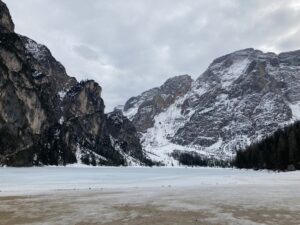
Pragser Wildsee
© Felicitas Weiß
internship and especially my travels afterwards and I would recommend doing one if you have
the chance.
When I arrived in March, the ski season was still in full swing, and with the Kronplatz as the
local mountain in Bruneck, it provided the perfect conditions for skiing. The snow-covered
slopes and breathtaking panorama made for unforgettable ski days. It was an excellent
opportunity to experience the beauty of the South Tyrolean mountains.
Later, I used my free time for extensive hikes to explore the nature of South Tyrol. The
surrounding landscapes offered a variety of hiking trails, lakes and summits. I strongly
recommend doing Piz da Peres and Peitlerkofel as well as a sunrise/sunset hike at Sambock.
In addition to exploring the local region, I embarked on exciting trips to some of Italy’s famous
cities. Venice, with its romantic canals and unique architecture, Verona with its impressive
Colosseum, and the fashion capital Milan were just a few of the captivating destinations. I also
visited Turin, Genova, Meran and the Garda Lake, each providing a different cultural diversity
and an immersive experience in the Italian way of life. It’s easy to reach those cities by train
and if you book in advance the tickets were very cheap.
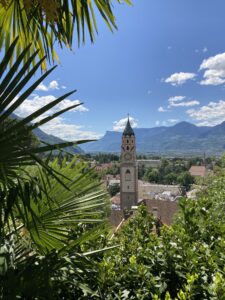
Meran
© Felicitas Weiß
The time spent with my roommates and my colleagues was also a highlight of my leisure
activities. We enjoyed the relaxed atmosphere of the aperitivo bars, went on great hikes, or even
paragliding together.
Overall, my leisure time during the internship was a perfect balance of active outdoor activities,
cultural explorations, and enjoyable camaraderie. The diverse opportunities the region offered
made this period an unforgettable and enriching experience during my time in the surgical
department.
5. Conclusion
In conclusion, my hospital internship in the surgery department was an incredibly enriching and
unforgettable experience. From the smooth preparation and comfortable accommodation to the
hands-on learning opportunities and supportive team, every aspect of the internship exceeded
my expectations. Additionally, exploring the beautiful landscapes, immersing myself in the
Italian language and culture, and forming lasting friendships with my colleagues made this
journey even more special. I am grateful for the knowledge and skills gained, and I will carry
the memories of this remarkable experience with me throughout my medical career.
Wonderful time in Vienna
- Medicine
- Austria, Vienna
- Universität Wien
- 03/2023 – 07/2023
1. Application/Internship search
My journey began 2 years ago, when I considered doing a tertial of my practical year abroad. I had already done an internship in gynaecology in Vorarlberg and really liked the system and the friendliness. Vienna was also not completely unknown to me from visits and so I decided to go to Vienna. Also, because it was a perfect fit with German as the national language and the hospital system is of a similar standard to Germany. So, I was able to find my way around quickly in my first few weeks and had no problems with a language barrier.
Now, it should be noted that you should plan early if you decide to go to Vienna. Places are in high demand and, with around 600 students a year from MedUni alo
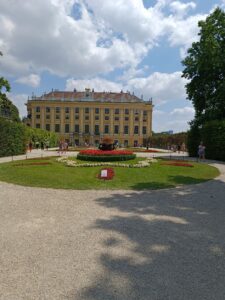
Schönbrunn Palace
© Lea Victoria Eckstein
ne, they are quickly filled. So, I started looking for a suitable hospital with the help of an online website and the PJ list of my state examination office. Ideally, it should already be recognised and a teaching hospital of the University of Vienna. That’s how I found the Franziskusspital Margareten, the former Hartmannspital. Maybe not outstanding in terms of size, but with its very own charm. I applied for a place in surgery, as this was one of the compulsory tertials in our PJ and relatively easy to complete abroad. I received positive feedback and was really looking forward to my time in Vienna.
The waiting time seemed long. Especially because the last information and documents were only sent shortly before the start. Not to mention that there were still problems with the recognition, because the “Landesprüfungsamt” requires a separate document for foreign tertials, which the University of Vienna does not sign. Instead, they issued a different document, which fortunately was recognised after a few exchanges of emails from the university PJ coordinators. Now, hopefully, nothing stood in the way of my stay, and I thought about suitable accommodation, travel health insurance and my financial situation. Since the practical year is generally not very well paid, I looked for options. I found an online article about the possibility of applying for an Erasmus+ scholarship, which was to be awarded specifically for internships. So, I tried my luck, and it took quite a bit of written arrangements, various emails and 2 application processes, but it was worth it. In January, 2 months before my stay abroad, I received feedback that my internship would be funded by the Erasmus+ programme of my university and that the University of Vienna also accepted my application within this framework and enrolled me as a temporary student.
This meant that I could register as a student in Vienna and received benefits such as the semester ticket, which allowed me to use public transport at very low cost from February to June. I was in contact with the International Office, which was very friendly and helpful. In Vienna itself, I made an appointment to clarify the final formalities. Beforehand, the entire application process and the document transfer took place via an online portal. This was uncomplicated and accompanied me until the end of the internship.
2. Accommodation & cost of living
Now the search for accommodation began, which I started relatively late, as a previously arranged accommodation through friends was not available in the end. In retrospect, this turned out to be fortunate. Just over a month before my trip, I started looking for a suitable room in a shared flat for the limited period. I simply used “wggesucht.de”. At first, it seemed quite difficult. There were a few ads, but only rarely did anyone respond to the request. But I was lucky, and a flat-sharing community contacted me. It was in the 3rd district and my job was in the 5th district. I could walk to work in half an hour or even faster by bus or tram. This seemed perfect and I was happy when I got an acceptance letter. Moreover, the price for the 10m^2 room with bunk bed was only 316€. It must be said that there is a much larger proportion of social housing in Vienna, which the city has subsidised and where the rents have remained cheap. That means you could get a bargain or two. However, the “normal” prices of the shared rooms tended to be much higher, around 500-600€.
On top of my rent, I had to pay my own monthly costs for various insurances, mobile phone tariffs and Spotify, as well as my old-age provision. That added up to quite a lot every month (about 280€).
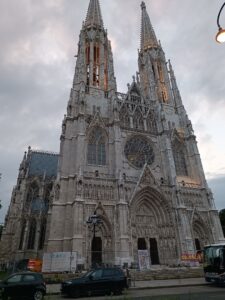
Votiv Church
© Lea Victoria Eckstein
And of course, there’s food, which is already more expensive here in Austria than in Germany. Inflation has made it even more expensive, but it was still a bit of a shock for me when I went shopping at Hofer/Aldi and spent about €50 on a normal weekly shopping trip instead of €25 (before inflation, admittedly). So, I spent about 200-250€ a month on food. All in all, I spent about 900€ a month. Then there were the leisure activities, and especially the months when visitors came, the monthly expenses were already over 1000€. All in all, Vienna is average, I would say, if you can find cheap accommodation. But the leisure activities can increase the expenses quite a bit, depending on how much you want to indulge yourself and how much you can. I also had a loan as a backup that I could fall back on. That’s something everyone must decide for themselves. Even though I would have liked to do without it altogether, I also needed the security to bridge the intermediate phases of the tertials.
3. Everyday life/internship
In March 2023, I started my journey with the DB to Vienna, whereby I planned some lead time for the bureaucratic things. I planned the registration with the city about 2 weeks before the trip and reserved an appointment. The same went for the International Office. That way, I was able to work through everything smoothly during my first few days in Vienna. I received a warm welcome from my shared flat and was able to settle into my room and explore the area very quickly.As my internship, I typically started my workday at 7am with the morning meeting. This meant I had to get up at just before 6 to get ready and get going on time. My way to work took me past Belvedere Palace, through long house canyons and across a playground to my hospital, which is integrated in the middle of a house block. There I was assigned my respective task in the morning. At the beginning, this consisted mainly of assisting in the operating theatre. But since the team was small overall, I was able to be a 1st assistant very often and learned how to sew in my time. I usually worked alone with a senior doctor at the table or also with a 2nd assistant. Otherwise, I worked on the ward and made admissions, went on rounds, helped the residents, and talked to the patients after the operation. On days when I didn’t have a fixed schedule, I was also able to go to endoscopy or special outpatient departments. Despite the small surgery, the spectrum was relatively broad because of the many affiliated doctors who came to the hospital to operate. There were orthopaedic, neurosurgical, and ophthalmic surgeries, for example, in which we worked rather subordinately. But there were also mamma operations and thyroid operations in addition to general surgery. So, I gained a relatively broad insight into surgery. Even though, of course, major operations and trauma
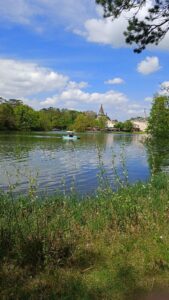
Laxenburg Castle
© Lea Victoria Eckstein
surgery were missing. However, this was made up for by the atmosphere. For me, the official end was at 1 pm plus a half-hour lunch break and 1 hour of self-study. Here in Austria, an hour of self-study is part of the working day for students. However, there were also days when I stayed longer in the operating theatre to help with an operation or to take some pictures on the ward. Afterwards, I went straight to the city or back home.
The team was very nice overall. I was integrated immediately and got my own phone, a locker and someone was always ready to explain things or let me try things out myself. In the operating theatre, the staff were very courteous and the atmosphere during the operations was relaxed to humorous, depending on the day. You could go to all the senior doctors at any time and especially to the head medical secretary in charge, who always had an open ear and with whom you could also talk about wishes for days off or holidays without any problems.
4. Free time/tips
In addition to work, there was also plenty of free time, and sightseeing was not neglected. Vienna is simply a beautiful city. Everywhere you look you see house facades with stucco or ornaments. The city simply has its very own flair. The big buildings like Sissi’s Hofburg, Schönbrunn Palace or St. Stephan’s are the most typical tourist destinations. But through my longer time in Vienna, the beautiful parks also won my attention. When winter gave way to spring, everything started to blossom and for such a big city, Vienna really has a lot of beautiful green spaces and parks all over the place. Even from my flat you had a view of a smaller park from the balcony. However, my personal highlight during my time was the Danube Island. I was particularly taken with it, because it is simply a very long island in the middle of the Danube surrounded by water and yet the big city. A piece of dysentery in the middle of the stress. It can even be reached by underground line U1 and is especially popular at weekends for cyclists, hikers, walkers, families, and students. It offers small restaurants, paved paths, access to the Danube for swimming, volleyball courts and barbecue areas. And of course, there is a lot of meadow and sunbathing areas where, in good weather, the most diverse groups spread out on blankets, but also individuals who just want to enjoy the sun. During my stay, the annual Danube Island Festival also took place where I could hear Felix Jaehn and Silbermond live. Apart from that, Vienna is just incredibly diverse. There is so much gastronomy and especially coffee houses, which are very popular and where you can eat typical Viennese specialities. The famous “Sachertorte” at Café Sacher or an Esterhazy slice at Gerstner’s? I recommend the Sacher cake at the “Hofzuckerbäckerei Demel”. It’s a little more tart and chocolaty to my taste. But everyone has their own taste:)
As for entertainment, there is so much to choose from that I often couldn’t decide what exactly I wanted to see. The many museums, but especially the theatre performances/the ballet/the musicals/the operas really appealed to me. With the Ticket Gretchen app, I was able to register as U27 and benefited from many offers and incredibly cheap tickets. For example, I was able to book a ticket for the Burgtheater and the Volksoper for €10-12 on certain dates in every seating category. I sat in the balcony with a direct view of the stage for a Shakespeare play or in the second row in front of the orchestra pit for a musical. Concerts in St. Stephan’s Basilica or dance evenings could also be attended at low cost.
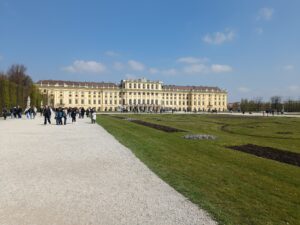
Schönbrunn Palace
© Lea Victoria Eckstein
As soon as I had visitors, I always went either to the State Opera, the Volksoper or to some other event. I wanted to experience most of the cultural offer. And it was worth it and can be recommended for anyone who is U27.
In May, the Vienna Festival Weeks started, with fairs, festivals and wine/beer festivals lined up on the weekends. There was not a weekend without a programme. And in some cases, admission was completely free, and you could just stroll through and enjoy.
5. Conclusion
Overall, I had an incredibly wonderful time in Vienna. And I would do it again every time. Both the work was fun, but also the city won me over. Seeing how summer comes to Vienna, how the parks become greener, how you can explore nature and the hiking trails in the surrounding area and still be able to enjoy the advantages of a big city with all its culinary and cultural offerings was a dream that I was able to fulfil. Thanks to the Erasmus funding, among other things, I was able to enjoy a few things without having to turn over every euro. I am very grateful for that.
Medical internship in Lyon
- Medicine
- France, Lyon
- Université Claude Bernard Lyon 1 – Hôpital Edouard Herriot
- 10/2022 – 02/2023
Preparation:
Around 6 – 7 months in advance I started applying at university hospitals in France that had a partnership with my university in Aachen. As soon as I got the approval for a 4-month-internship at the University Claude Bernard Lyon 1 I applied for the Erasmus + traineeship programme with the support of the international office at my hometown university. Within a few weeks everything was set and I only had to take care of the needed insurances for the internship and started looking for accomodation in Lyon.
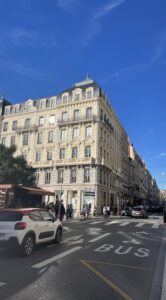
© Semiha Apaydin
Accomodation:
First of, housing in Lyon can be very frustrating. For my part I ended up doing a sort of flat-hopping. I had already heard a lot about the difficulties of finding housing in Lyon. Since I had a student status I could apply for student housing offered by the Crous but ended up not getting a spot. Therefore, I tried several months ahead to find a room in a shared flat on websites (lacartedescolocs.fr, leboncoin.fr) that people recommended in blogs. In the end I decided to text people who posted into Facebook groups about sub-letting their rooms for 1-2 months and finally ended up living in three differents apartments during my four months. This might sound very exhausting but it actually made my stay and experience very special as I got to live with different people in different parts of the city and made a lot of friends in an unique way.
Transportation:
To go to my internship and almost everywhere else in the city by metro (or bus) I had a public transport card from TCL which costs 25 Euros/month for students. Additionally, I subscribed to Velo’v bikes which were really useful when staying out late or just having an afternoon stroll along the river. Bike stops can be found everywhere in and around the city and the subscription costs 15 Euros/year.
Daily life:
As one of the biggest French cities, Lyon has a lot to offer without being too big or chaotic. Everything can be reached with the metro in less than 30 minutes and there are always events around the city. Especially if you are interested in going to museums, the cinema or the theatre, I can highly recommend the Carte Culturel for about 18 Euros which offers free or at least discounted entry fees.
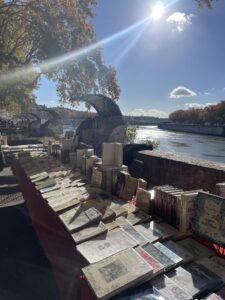
© Semiha Apaydin
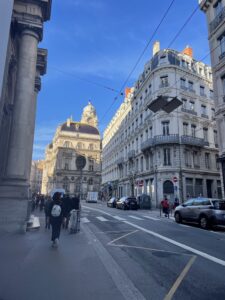
© Semiha Apaydin
On warm days everyone is meeting up at one of the two rivers or in the Parc de la Tête d’Or which was also one of my favourite spots in the city. A common thing to do after work or just with friends are Apéros which are usually just a little get-together in a bar for example. It is mostly before dinner and includes drinks and snacks.
Every day life including grocery shopping, going out for drinks or a restaurant were generally a more expensive than in Aachen. Concerning payments I always paid with my German Debit or Visa Card and barely needed cash. Also, I kept using my German mobile phone number and contract.
Additionally, it is very easy to travel around Lyon as Paris, Annecy, Nice and a lot of other pretty cities are easy to reach by train or BlaBlaCar (long-distance carpooling application) which is very popular in France.
Internship:
During my first six weeks I was in Internal Medicine. As we were only two externs (students are called externs at the hospital while residents are called interns) there was a lot to do for us. I mostly covered administrative tasks including phone calls and and preparing patient files but was also responsible for being the first one who examines newly administered patients on the unite. In the beginning I was a bit overwhelmed especially when having to do phone calls. On the other side, this helped me a lot to understand the language and speak freely in a short amount of time.
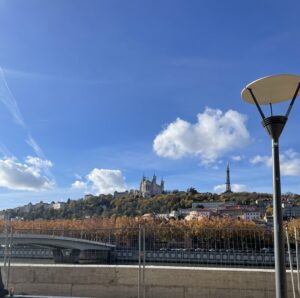
© Semiha Apaydin
I spent the followoing six weeks in Digestive Surgery. This internship was rather observatory. The interns explained a lot but I did not feel like being a great help to them as there were almost no tasks for us students. Every thursaday, the department organised a teaching session with the students and one of the doctors. Each week two students had to present a patient’s case which was then discussed.
During my last six weeks I was assigned to the department of Dermatology. Dermatology at HEH consisted mainly of accompanying a residents for the planned or emergency consultations. Every student was assigned to resident. One of my tasks was to carry out skin biopsies, this way I additinally got to work on my suturing skills.
Conclusion:
Even though I struggled a lot finding an apartment in the beginning, everything else was so easy going and made me love my stay in Lyon a lot. Lyon offers everything one could search for especially regarding cultural activities while yet not being over-crowded. Especially with it’s two rivers paired with the French enthusiasm to go out, especially after work, the city has an inviting charme that inspires for deceleration.

